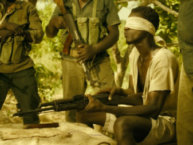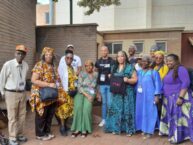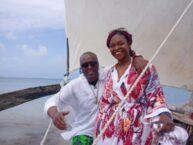3 September 1983
Dear Matilda,
I hope you don’t mind that I’m writing in your notebook, but I couldn’t think of any other way to reach you. In the morning I’ll ask Mercy to take it to your parents’ house in the compound. After all, it belongs to you. For me, what happened all comes down to a simple fact: you needed me and I let you down. We were only running partners, but still. I never told anyone, and I suspect you didn’t either. What would we say? If you do end up reading this letter, I hope it will mean something to you, that you might find it possible to trust another girl like me, although not from here. Better Canada or Australia, somewhere without an ugly history that bullies its way into people’s lives.
My English mother could have gone anywhere in the world, but instead came here in 1966 to visit a friend who ran a sewing cooperative for African women. Why would she choose a country at war? At the country club one evening she met my Rhodesian dad. Mum says that while she was “shocked” by my dad’s “establishment” views, she has always been attracted to conservative, military men. And he had a good job as a manager in Eldorado Mines; this must have meant a great deal to a working-class girl from a mining village in Yorkshire. My mother quickly gave up her plan to “change the world,” married my dad, and had a child. As far as I can tell my parents’ views are fairly similar.
Mum still describes herself as a “hippy,” and except for her long hair she bears no resemblance to the expat workers (dad calls them “bladdy Yank hippies”) who have been flooding the country for a year or two. Presumably they are here to help people like Jane, to save them from their madams.
My mum tells me that she respects the Prime Minister, but then treats our maid Jane very badly. Jane works from dawn to past dusk most days, and only has Sunday morning and Wednesday afternoon free so that she can attend church. Mum yells at Jane if she makes a mistakewith the washing or neglects to set the table properly. Sometimes I feel really horrible for our maid because I understand what it is like to be her. Mum makes me feel like I’ve committed a crime when I don’t put on a suitable outfit for the country club or forget my manners when I’m introduced to one of her boring friends. “Zoe, stand up straight and offer a firm handshake. Don’t let me ever see you behave in that manner again. And what are you wearing? Old tackies to the club? Oh, dear God.” Sometimes I notice if Jane has forgotten some detail – an open cupboard door, missing pudding spoons – and I fix it. It makes me nervous when mum raises her voice.
You and I met two years ago. It was the start of the winter holiday, I remember, because it was cold. On my first early-morning run through the bush near our property my breath was visible, and I was sprinting in an effort to warm my frozen toes and fingers. I looked down for a moment to slip on my gloves. Almost immediately someone screamed (“Aieee!”). I was startled to see a tall skinny black girl blocking the path. “I’m sorry,” I stammered, “I was just trying to warm my hands. Hey, man, it’s lekker cold this morning, hey?” The girl stared at me for a few seconds, and then her face lit up. “Good morning, shamwari,” she said, and then cupped her hands in greeting. “Do you want to run with?” I asked her. She nodded. That girl was you, of course, Matilda. I was wearing my worn school tracksuit, and you had on track pants and a colourful jersey. No gloves, but a sweet little pink hat. When I offered you my gloves you shook your head and smiled. Just like that last time, you nudged me along an unfamiliar path. The rising winter sun and our quickening pace warmed our bodies.
In less than half an hour we reached the dam and stopped to look into the deep green pool. I remember you saying, “You like to come here, yes? Bathe in the sun?” I told you that my mum would never permit that; I was only allowed to swim in a pool – at home, school, or the club. I was embarrassed because I thought I might have offended you. Really, you looked confused, but shook it off and took me back to where we began. I was used to running alone, but running with you felt right. Shyly, I asked if you would like to run with me again and we agreed to meet the next morning at 6:30. I watched you slow-jog back to the mineworkers’ compound, and I too headed home for Jane’s maize porridge. My belly felt empty, but I was exhilarated by my run with possibly my first real African friend.
Before I started school I played with Jane’s son, Phineas. Now we both live away from home: boarding school in the Republic for me, and working as a security guard in town for him. He’s two years older than me, and so we must have been four and six when we first started playing together. We played marbles, football, and sometimes house. Once mum caught us playing house when we were probably eight and ten – I was the wife and he was the husband – and she quickly broke up the game. I felt ashamed, and Phineas was sheepish after that. I didn’t really understand what we did wrong as we weren’t kissing and cuddling; rather, I greeted my husband at the door, handed him a gin and tonic (actually, Mazoe orange), and offered to remove his shoes. He said “thank you, my dear” (I wrote the lines) and sat down at my child’s table and chairs while I kneeled down to remove his shoes and tell him all about the trials of my day. I don’t know how much of this my mother witnessed: likely enough to see she and my dad reflected in our game. I now understand that it was (still is) inappropriate for us to play house. My mother would never prohibit this outright, and instead suggested that we play another game – marbles or cards; but the tight, forced smile on her face that day betrayed her discomfort with our game.
It was soon after Phineas and I were caught that I was sent away to boarding school. While I could have seen this as punishment or exile, from the beginning I liked going away to school, first here and then three years ago they sent me to South Africa. I know this is going to change. In the Republic teenagers like you are protesting about their inferior schools. Right now there is no war there, but I can still remember our war. You may aswell, but our memories must be different. I remember the huge convoys when all of the parents drove their kids to school for the start of term: army vehicles at the front and rear, farmers’ and mine managers’ vehicles in between. It wasn’t normal, but it was a familiar routine for all of us kids used to violence and death and fear. Now I drive alone with my parents to school and spend three-month terms with kids like me. At the end of each term they collect me –mum always smiles and wears pink lipstick for the occasion, dad wears good trousers and a dress shirt – and I say goodbye to my “chums,” as my parents call them.
This is what my parents wanted: for me to be with my peers. As you know, the former “A” schools are now mixed. Going to school in South Africa is an exercise in nostalgia or worse. There are no girls like you on our athletics squad, and so I can be top girl. I like being the fastest girl in the school, but I wouldn’t be if I went to school here, even though granddad says I run “like a kaffir.” He’s old and lives in the past. At Anne’s school in Harare, there are a lot of new pupils and many of them are good runners. I never told you about Anne; really we didn’t talk about much. She is my best friend, although we don’t really talk about much either – let alone exchange writing folders like you and me. Anyway, even though she is a decent runner Anne now finishes near the middle of the pack. These new girls aren’t like you exactly: they are well off, the daughters of government ministers. Even so, South Africa isn’t an option for them.
I suppose the only things that set me apart from other kids at school are running and writing. When I’m not running I’m writing. In the morning I wake up early, put on my running kit, and head to the school track, or even the bush trail if it is light enough. When I return to my dormitory, I record all of the thoughts and ideas the run generates. Running makes me creative, helps me to solve problems, and helps me with my homework. Once I memorized all the regions of South Africa and their major exports. I couldn’t store these details in the quiet of my room, but somehow managed on the track without notes, pen, and paper. It must be the rhythm of running. It’s like my feet and the movement of my arms create the music, and the words in my head (lists, maps, story ideas for English or Afrikaans) are the lyrics. I think it might be like this for you too, Matilda.
We never talked about why we run on those early winter mornings. Me, I run to calm my nerves. Every morning I wake up with my heart racing as if I’m halfway through a race, instead of in bed. At the same time I feel this knot in my stomach, and I have to move. When I start to run my heartbeat steadies, keeps time with my feet. And just as expected that knot unwinds. Sometimes I even dream about running. It’s usually dark, but I have no difficulty avoiding branches, roots, puddles, any and all obstacles. I never stumble and I am never afraid, like the cheetah I once saw at the Kruger Park. After a night spent running I wake up calm and drink the tea Jane leaves on my bedside table. Naturally, those are my rest days.
I like your school: the poinsettia bushes surrounding the school sign, the dusty path filled with excited students, some of them without shoes but still looking neat and tidy and “ready to learn” (the school’s motto, written on the fresh new sign). I especially like the school’s garden, always with a number of children bent at the waist as they tend to the carrots, tomatoes, and rape. Sometimes Jane makes me sadza with rape and tomatoes, which she calls a relish. When mum and dad aren’t home, we eat on the floor of the sitting room. Jane instructs me to sit with my legs folded modestly to one side, and she has taught me the elaborate hand-washing ritual that takes place before every meal in the rural areas. We eat with our hands. If only mum could experience the special pleasure of eating food with her hands. No tools, nothing comes between the food and the body. Fingers roll a ball of sadza and then use it to scoop the relish. Quickly, the hand transports the food to the expectant mouth. Pure pleasure. I treasure those teatimes alone with Jane. Sometimes we watch television: Dallas or Dynasty.
Do you have a favourite television program? I never told my mum about our friendship, if that’s what it could have been called. Were we really friends, or were we just playing? No, it wasn’t like Phineas. I didn’t write our lines; in fact, there was very little dialogue. Most of what we learned about each other was through running and writing. One morning you brought me an exercise book full of stories about your family and friends. I know that your favourite subjects are English and Maths, and that like me you want to be a writer one day. I also know that your parents came here from Mozambique years ago to find work, learned the language and culture, and never returned to their pretty little coastal village.
Your exercise book opened up a whole world to me; it felt so generous. I went directly to my room after our run and hid it under my mattress. That night, with a torch under the eiderdown, I read about your life. I really had no idea about how black people live in this country, but imagined that I did because of Jane and Phineas. After reading your book, I realized that black people have lives that don’t always intersect with ours. That was a shock, the first of many. The next morning I tried to match your generosity by offering you my folder of stories and poems.
I’ve always found it easy to write, perhaps because I am a selfish. When I look back now I realize that all of my stories are about me. There was no one else to consult, just the stories and feelings stored in my mind. It sounds odd, I know, but I kind of feel like I was there, inside your body and mind, when they did what they did to you. But I wasn’t really, and this is why I can’t quite find the words to describe what happened. I am desperate to talk to you, Matilda, but I know that even then we would both struggle to communicate. Our relationship is based on running and the exchange of written stories. So, I am praying that you will respond and we can suture our jagged stories together.
I think you were the first one to hear the sound of extra footsteps. You looked back, and you never did that. I heard your breathing change from steady and calm to rapid and agitated. When I felt your hand on my arm urging me forward, I began to panic. We never looked at each other when we ran, but we always knew to stay in rhythm. No words were exchanged.
“Ag man, we need to teach this kaffir bitch a lesson. She messed with our boet. Made a fool of him in front of his girl and her folks. He was only being pleasant when he touched her boob, but she took it too far. Wouldn’t let bygones be bygones. Struth.”
Your eyes seemed to plead with me to stay. The boys told me to go home, but I hid behind a small kopje. I could hear them, but not you. After half an hour, an hour, the entire morning, who knows, I heard the boys move away from the scene. They laughed as they walked past my hiding spot. I trembled and panted so violently, I was sure I would be discovered. When their voices faded, I heard uneven footsteps. Your shirt was ripped at the sleeve, your pants were wet, and your face was cut and bruised. And when your eyes caught mine, you looked away and started on the track home. I caught up with you and supported your weight. Our walk to the compound was wordless, but in a different way. I haven’t seen you since you released yourself from my grip and headed home without a word or a glance back.
I ran to calm my nerves, yes, but also to try to figure out where I am. When I touched the ground, one foot at a time, and smelled the bush where I live, I knew where I was. Here in Zimbabwe, a new country but still old and familiar. I think what happened to you – to us – taught me that the ugliness of the past is still here. Two girls, one white and one black, were running partners. And then they did what they did to you. That’s the past, isn’t it? But it’s not: it’s the present too. And nobody is talking about it. I don’t know where I am anymore. There is no certainty, and running no longer helps. The gnawing in my stomach is always there and the ground feels unsteady with each footfall. I feel like I’m running in place, going nowhere, the opposite of my dreams. I’m disorientated and lost.
When I am away from home, I miss the predictability of Mutorashanga’s winter sun: its morning promise, its midday brightness, even its sudden disappearance before Jane sets the table for dinner. Always the same.
Despite the lovely sameness of winter mornings at home, it is only today that I managed to pull myself from bed in an attempt to run. Outside everything seemed different and unfamiliar. The smell of doused cooking fires made me cough and choke. The hollow echo of my footsteps on the dirt path made my teeth chatter. Despite my warm tracksuit and new trainers, I felt cold and defeated. It was as if the shrill call of the swarming Quelea birds commanded me to retreat. I obeyed them, skulked home, and crawled back into my now-cold bed.
I know the boys – they are the sons of some of my dad’s workmates. I see them at the club – swimming and playing tennis with their families and their girlfriends. Just this afternoon one of them, Peter, winked at me, put a finger to his lips, and whispered a command:
“Shhhhh, girlie.”
And so tonight I felt the need to write this letter.You must write back – in blue ink, in red dust. It doesn’t matter. I don’t know. Please.
Zoe
About the Author
Julie Cairnie is an Associate Professor in the School of English and Theatre Studies at the University of Guelph (Canada). She teaches and researches southern African literature -- with special interests in gender, sport, and childhood. Her academic and creative work is deeply informed by her experience as a temporary teacher in Mutorashanga in the late 1980's. Some of her recent publications include a biographical essay, "Eating Lemon Poppy-Seed Muffins with Yvonne Vera" (Emerging Perspectives on Yvonne Vera, Africa World Press, 2012) and a co-edited multi-media anthology, Moving Spirit: The Legacy of Dambudzo Marechera in the 21st Century (Lit-Verlag, 2012). Julie is close to finishing her first novel, The Book of Everything, set in three countries close to her heart: Scotland, Canada, and Zimbabwe.






1 comment for “Running Partners by Julie Cairnie”